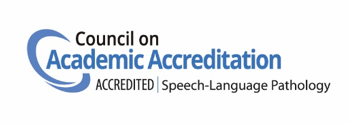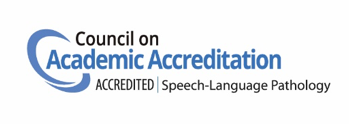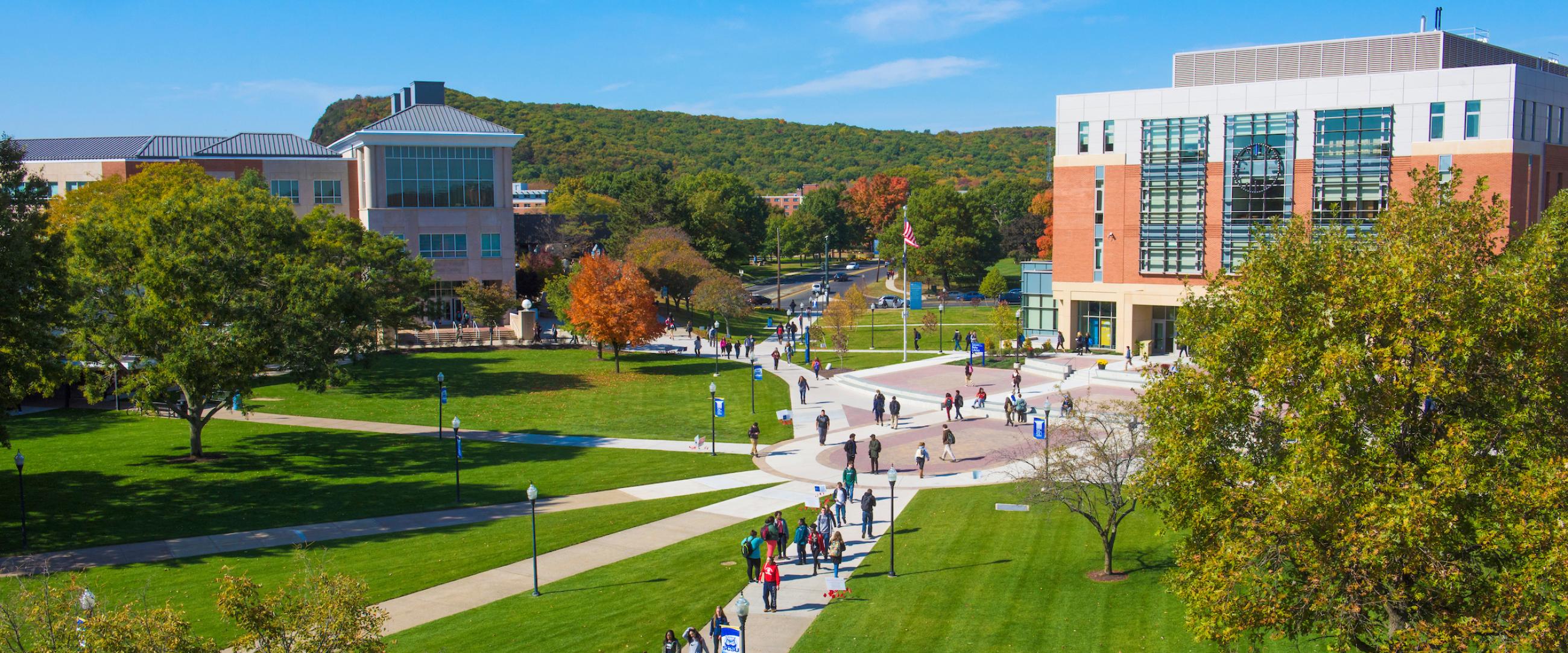The Master of Science degree with a major in Speech-Language Pathology prepares students to practice in public and private schools, hospitals, rehabilitation centers, and private practice as speech-language pathologists. The educational program includes instruction in a broad array of diagnostic and treatment paradigms as well as supervised hands-on experience in the department's unique Center for Communication Disorders and at selected off-campus sites including schools and hospitals.
Program Features
- Five-semester, 63 – 66 credit Master of Science degree program
- Full-time program delivered on SCSU's campus
- 100% post-graduate employment rate
- Opportunities to engage in exciting theoretical and clinical research with faculty who have clinical and/or research collaborations with Yale-New Haven Hospital, Connecticut Children’s Medical Center, and the VA Medical Center-West Haven
- Comprehensive clinical experiences across the lifespan through our on-campus clinical programs (Center for Communication Disorders, Access Network, and Southern Connecticut Audiology Services)
- Program meets the requirements for certification in speech-language pathology by the American Speech-Language-Hearing Association (ASHA), Connecticut licensure, and special endorsement 061 in speech-language pathology for Connecticut public schools
Individuals who enter the graduate program with all prerequisite coursework can complete the graduate program in five semesters, full-time (Fall, Spring, Summer, Fall, Spring). Individual programs for all students are designed to meet the requirements for certification in speech-language pathology by the American Speech-Language-Hearing Association (ASHA), Connecticut licensure, and special endorsement in speech-language pathology for Connecticut public schools. The Graduate Program Coordinator will review students’ prior coursework to confirm that all prerequisite courses have been completed and meet with students to plan their program.
Students must maintain an overall and departmental GPA of 3.0 to remain in the program. A “B-” or higher must be achieved in all academic courses and clinical practica.
Prior to the start of the graduate program in communication disorders, you must complete both ASHA prerequisite coursework and pre-professional coursework. Specific requirements for these prerequisites are outlined below.
ASHA Prerequisite Coursework
Prior to the start of the graduate program in communication disorders, you must complete courses in the following content areas:
- Biological (human or animal) (1 course)
- Physical Science (physics or chemistry) (1 course)
- Statistics (1 course)
- Social/Behavioral Science (psychology, sociology, anthropology, public health) (2 courses)
Pre-Professional Prerequisite Coursework
Prior to the start of the graduate program in communication disorders, you must either:
- earn a bachelor's degree in communication disorders and sciences (speech-language-hearing sciences), OR
- have completed course content in the following areas:
- Phonetics and Phonological Systems
- Anatomy and Physiology of the Speech and Hearing Mechanisms
- Language Development
- Introduction to Audiology and Hearing Science
- Neurological Bases of Communication
- Speech Science
- Clinical Practice of Speech-Language Pathology and Audiology
The Connecticut State Department of Education has specific requirements a student must meet to work as an SLP in the school setting. The CMD master’s program includes course and clinical requirements to meet all requirements, except a 3-credit course in special education.
A prospective student will need to meet the requirement of a 3-credit course in special education. The course must include study in understanding the growth and development of exceptional children, including disability and gifted and talented children and children who may require special education, and methods for identifying, planning for, and working effectively with special-needs children in the general education classroom.
If you completed a special education course at a university outside of the state of Connecticut and you believe the course meets the above criteria, you may send your course syllabi to the SCSU College of Education Certification Officer (certification@southernct.edu) to determine whether it would be approved to meet the requirement.
If you have not completed this course, you are encouraged to review and enroll in one of the approved courses on the State Department of Education’s website prior to beginning the master’s degree program.
The Department of Communication Disorders offers a limited number of graduate assistant positions on a competitive basis. Graduate assistants support the research and/or teaching needs of the department.
- Completion of all required and elective courses in a planned program with a GPA of at least 3.0 within the six-year limit.
- Complete all clinical hours and practica requirements to meet ASHA and department standards.
- Complete capstone - Either pass CMD 605 - Special Projects or successfully complete thesis (approved by School of Graduate Studies).
- Pass Praxis II test for speech-language pathology. Be sure to use the following codes when taking the test to ensure that your score is sent to these agencies. If you are planning to apply for a license in a state other than Connecticut, you will need to be sure to look up the code for that state to have the scores sent directly to them as well.
- CT State Department of Public Health: Code R7051
- ASHA: Code R5031
- SCSU Records: Code RA3662
- Apply for credentials to practice as a Speech Language Pathologist. The following are links to the agencies for licensure and teacher certification in Connecticut and for ASHA certification. It is important to review the requirements and contact the relevant agency for support.
- CT State Licensure
- Teacher Certification: Speech-language pathologists who work in Connecticut public schools must have school certification (Special Endorsement – 061 – Speech-Language Pathology). Once enrolled, the College of Education Certification Officer will review transcripts and communicate which course requirement(s) needs to be completed. The Graduate Program Coordinator can assist in locating courses as indicated by the Certification Office.
- ASHA certification
Careers
The Master of Science degree in Speech-Language Pathology at Southern equips you with the expertise and clinical experience needed to become a certified Speech-Language Pathologist. This program prepares you for licensure and certification, enabling you to work in schools, hospitals, and private practices, where you’ll make a meaningful impact on individuals' communication abilities.
The Master of Science program in Speech-Language Pathology at Southern Connecticut State University is accredited by the Council on Academic Accreditation in Audiology and Speech-Language Pathology of the American Speech-Language-Hearing Association, 220 Research Boulevard #310, Rockville, Maryland, 20850, 800-498-2071 or 301-296-5700. The current accreditation cycle expires in November 2026.

Role and Value of ASHA - CAA Accreditation
ASHA's interest in accreditation is based upon the belief that all professions that provide services to the public have an obligation to ensure, as far as possible, that services provided by its members are of high professional quality. One effective way in which this obligation can be met is by establishing appropriate standards of educational quality and by identifying publicly those educational programs that meet or exceed these standards. Accreditation is intended to protect the interests of students; benefit the public; and improve the quality of teaching, learning, research, and professional practice. Through its accreditation standards, the accrediting body encourages institutional freedom, ongoing improvement of educational institutions and training programs, sound educational experimentation, and constructive innovation.
Vision
The SCSU Dept of CMD will be the leader in attracting and preparing an exemplary, diverse student body who will be competent in using innovative, evidence-based practices responsive to the culture and unique needs of all individuals with communication disorders and differences across the life span.
Mission
Through its’ unwavering commitment to current, innovative academic and clinical curriculum, and equity-minded policies, the Department of Communication Disorders will prepare future Speech-Language Pathologists with the knowledge and skills needed to enrich the lives of the people they serve and the wider community in which they live.
To accomplish this mission, the Department will:
- Listen to all voices and experiences to create an inclusive culture dedicated to upholding the basic human rights of equality, freedom, and justice for all our students, faculty, staff, and the clients we serve.
- Support, conduct and disseminate essential, impactful clinical research
- Engage in interprofessional education and practice to foster collaboration and provision of comprehensive client services.
- Embrace innovative, effective clinical practice and service delivery models in our state-of-the art clinic and our myriad clinical practicum opportunities.
- Utilize dynamic teaching approaches to deliver curriculum that reflects the profession’s evolving scope of practice and prepares students to become life-long learners and evidence-based practitioners
- Advance our discipline by educating the general public about our mission and available services
- Foster leadership and advocacy in our students and faculty to effectively engage in culturally responsive practice
Program Goals
- Expand program offerings to align with student and stakeholder needs such as shortage of SLP, SLP assistants, Multilingual SLPs, doctoral level SLPs
- Increase enrollment and retention of students who identify as Black, African-American, Latinx, Native American, Asian, Male, and/or LGBTQ in our undergraduate and graduate programs to foster increased representation across the fields of Speech-Language Pathology and Audiology
- Increase breadth of clinical learning /service opportunities for students to meet current and imminent changes within the profession and community
- Increase student capacity to engage in interprofessional practice, to use culturally responsive approaches, and to serve clients with specialized needs
- Revise all CMD policies and procedures to reflect equity, access, diversity, and inclusion to result in a more diverse student body in both undergraduate and graduate programs
- To expand and enhance research experiences for faculty and students to result in greater contribution to the profession and community
- Increase CMD faculty understanding of the processes of anti-bias and anti-racism work and their role to support equity, access, diversity, and inclusion in the CMD program.
- Students will demonstrate knowledge in the following areas: normal developmental processes; hearing science; speech science; diagnostic audiology; rehabilitative audiology; research in the field of communication disorders; diagnostic and remedial principles in communication disorders; learning theory; cognitive development; dysphagia; literacy. This professional competence is demonstrated through successful completion of the ASHA Knowledge and Skills Acquisition (KASA) requirements.
- Students will demonstrate knowledge of research findings and an interest in continuing education in order to develop and maintain clinical competencies to meet the needs of the speech-language-hearing impaired individual. This is demonstrated through completion of the Competency-Based Evaluation for Clinical Practicum and successful completion of the 605 capstone project or a thesis.
- Students will demonstrate skills in goal setting, evaluation, interpersonal management, counseling, and professional report writing. This is demonstrated through the successful generalization of knowledge and skills as assessed by clinical instructors incidentally and through completion of the Competency-Based Evaluation for Clinical Practicum.
The Department of Communication Disorders offers an undergraduate major and a graduate major in communication disorders. Students who have an undergraduate degree in any field from an accredited university are encouraged to apply for entrance into the graduate program. Prerequisite course work is incorporated into the student's graduate planned program. Students may choose full-time or part-time study; however, the last two semesters of the program must be full-time in order to complete two off-campus clinical practica (typically 40 hours per week).

Accreditation
The Master of Science (M.S.) education program in speech-language pathology (residential) at Southern Connecticut State University is accredited by the Council on Academic Accreditation in Audiology and Speech-Language Pathology of the American Speech-Language-Hearing Association, 2200 Research Boulevard #310, Rockville, Maryland, 20850, 800-498-2071 or 301-296-5700. The current accreditation cycle expires in November 2026.
On-Time Program Completion Rates
|
Period |
# Completed within |
% Completed within |
|
Recent Year |
43 |
98% |
|
1 Year Prior |
41 |
100% |
|
2 Years Prior |
43 |
98% |
Praxis Pass Rates
|
Reporting Period |
# Taking the Exam |
# Passed Exam |
% Passed Exam Rate |
|
Recent Year |
33 |
31 |
94% |
|
1 Year Prior |
43 |
39 |
91% |
|
2 Years Prior |
41 |
41 |
100% |
Note: The Praxis examination reporting period is the testing year or examination cycle, not the year of graduation for the test-takers. The data for each reporting period may include test-takers who graduated from the program within the prior 3 years.
Apply Now
Email Us
CommunicationDisordersGrad@SouthernCT.edu
Application Requirements
School / College
College of Health & Human Services
Department
Communication Disorders
Contact
Julian Smith, Ph.D., CCC-SLP

